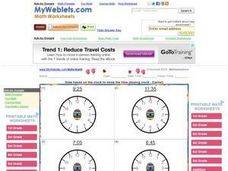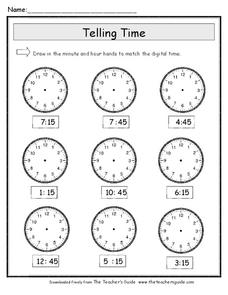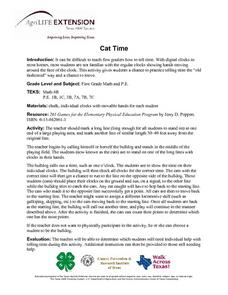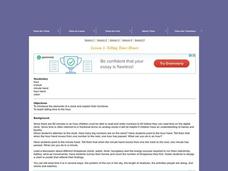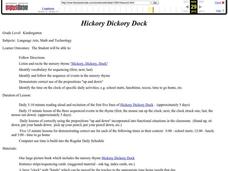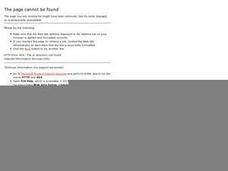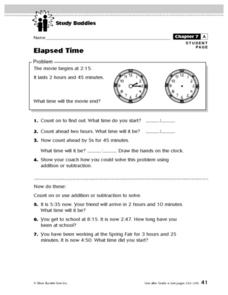Curated OER
Show the Time
In this writing the time worksheet, students use problem solving skills to draw hands on 6 blank clocks to accurately show the 6 digital times listed.
Pennsylvania Department of Education
Build What I've Created
n this geometric lesson plan, students define and identify two dimensional shapes based on their attributes. They complete worksheets based on the geometric concepts.
Curated OER
Telling Time #5
For this telling time worksheet, students draw minute and hour hands on clock faces to match digital times beneath each. A website reference for additional resources is given.
Curated OER
Telling Time #6
In this telling time worksheet, students draw minute and hour hands on clocks to match digital times shown beneath. A website reference for additional resources is given.
Curated OER
Telling Time #4
For this telling time worksheet, students draw minute and hour hands on clocks that show the digital times written beneath. A website reference for additional resources is given.
Curated OER
Telling Time #3
In this telling time worksheet, students draw minute and hour hands on clock faces to match digital times given beneath each. A website reference for additional resources is given.
Curated OER
Time to 15 Minutes: Reteach
In this telling time in 15 minute increments activity, students use the analog clocks to help them find the time using 15 minute increments. Students write the digital time in the blanks in the first set. In the second set, students draw...
Curated OER
Cat Time
First graders demonstrate telling time on clocks. They stand at one end of a field while the teacher calls out a time. They )cats) who set their clocks to the correct time try to run past the teacher (bulldog) without getting caught.
Curated OER
Thirsty Rocks: Please "Porous" a Drink!
A simple activity goes a long way in demonstrating the property of porosity to your rock hounds. They will mass a specimen of dry sandstone and then soak it in a pre-measured amount of water. After seven minutes, they once again measure...
Curated OER
What Time is It?
In this vocabulary and reading comprehension worksheet, students read a 1 page selection about clocks, label a drawing with 6 terms, and respond to 11 short answer and fill in the blank questions.
Curated OER
Telling Time: Hours
Students participate in a discussion about the different types of timepieces and the energy sources necessary to run them. They observe the numbers on a clock and review the hands and what they mean and make individual clocks using a...
Curated OER
Time & Itineraries Two
Learners explore time management by participating in clock reading activities. In this itinerary lesson, students define a list of time telling vocabulary terms and practice reading analog clocks with a partner. Learners identify ways to...
Curated OER
Hickory Dickory Dock
Students use the Hickory Dickory Dock nursery rhyme to learn about rhyme, telling time, and preposition use. In this nursery rhyme lesson, students read the nursery rhyme daily and complete a Mother Goose quiz. Students sequence the...
Curated OER
Keeps on Pumping
Students measure and calculate heart rates per minute and for other units of time. They determine the amount of blood pumped by their heart during various intervals of time.
Curated OER
Half An Hour Later
In this time worksheet, students look at the times shown on both digital and analog clock faces. They make the clock next to each one show a half-hour later. They tell if the hour hand is closer to the 3 or 4 when it is 3:30 while...
Curated OER
Time Lesson
Second graders observe a clock and discuss at what time of day they perform a certain task such as what time they wake up, go to sleep, etc. They use a clock and show what time they wake up in the morning differentiating whether it is...
Curated OER
Kindergarten Shape Books
Students, in groups, identify examples of shapes around the school site. They take digital pictures of these shapes and use them to construct a class book.
Curated OER
Prince Waffle's Grain Group
Second graders participate in activities focusing on the grain group and food prices.
Curated OER
Discovery Pacing
Students discover strategies for pacing themselves when running longer distances on a quarter mile track.
Curated OER
The Very Grouchy Ladybug: Telling Time
Students practice telling time by reading a children's story. In this time keeping lesson, students read the book The Very Grouchy Ladybug by Eric Carl, and create a schedule for the ladybug to complete certain activities. Students...
Curated OER
Study Buddies: Elapsed Time
In this math worksheet, young scholars will work with a coach to solve a problem about elapsed time. Students will follow a step-by-step process and notes are provided for the coach.
Curated OER
Basic Units of Time
Students review fundamental concepts of time such as A.M. and P.M. and learn about elapsed time. In this Unit of Time lesson, students review the basics of how to tell time and then are given examples to figure out how much time has...
Curated OER
Ins and Outs of Respiration
Students determine their respiratory rate and explore the factors that affect breathing rate.
Curated OER
The Physics of Cell Phones
Students explain how cell phones work. In this physics lesson, students describe the advantages and advantages of having one. They identify the different parts of a cell phone.


